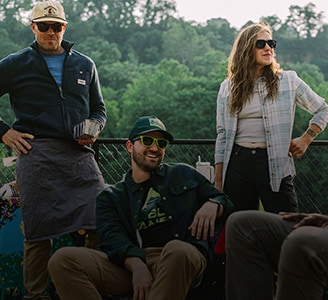PUBLIC LANDS: You stepped away from the baseball diamond and climbed on the bike saddle. What is it about mountain biking that sparked the transition?ANGELO WASHINGTON: It’s all you. If you mess up, you have nobody else to blame but yourself. Sometimes mistakes happen, but it’s one of those things that you build upon. My season last year, that was me. Being able to figure out what’s bothering me or what’s messing me up mentally: That’s the process about mountain biking that I like.
You’ve been coaching now as well. What drew you to that aspect of the sport?To be honest, when I first started, I really didn’t want to coach. I just wanted to race. It just became one of those things where everybody in the city was like, ‘Hey man, you should start coaching.’ And about two and a half years ago my girlfriend said, ‘Maybe you should try coaching out.’ I put a post up on Facebook saying, ‘Hey, let’s go learn how to do bunny hops and stuff at Pocahontas Park’—eighty people signed up.
After doing my first couple of lessons and seeing the gratification on people’s faces was when I realized, ‘Oh, that was fun.’ To see those aha moments: That’s what really drives me now, to see people get it.
You’re an athlete working with youth riders, building your coaching practice, and have also gotten involved with different riding groups. Do you feel you have a role within the mountain biking community?
I would say the biggest thing for me is representation. In 2014, I had no idea mountain biking existed. I had no idea Richmond had mountain bike trails. 2016 was my first year racing, and the group I used to ride with took me to Snowshoe for the very first time. We were up there Memorial Day weekend for four days, I didn't see one other Black person riding bikes. So I was kind of like, Oh, wow, I’m the only one here, but it’s cool. Everybody treated me like family, but it was just a culture shock. Besides Elliot Jackson, there are no other African Americans in pro downhill racing.
Another time I remember at Massanutten. I’m pushing up the hill with my teammates, getting ready to do some practice runs. And this group, one is an older Black woman, they walk past us, and she goes ‘Baby, we don’t do this.’ And she's rubbing the top of her head. So I’m looking at her like, What do you mean? And she’s like, ‘Baby, we don't do this.’ The guys, they saw it, and I just walked off and we got up to the top and we rode.
Something about it rubbed me some kind of way. Like, What do you mean? I’m not supposed to be able to ride a bike? I’m hanging out with my friends, why can’t I do this? I was 29 years old at that point. It’s been one of my things now to be that representation in my community. So they can see, there’s all sorts of things out here they can do.
Absolutely. So, that really puts the emphasis on exposure then?
Growing up in the inner city, we get so lost on the big three sports: basketball, football, and baseball. In the city, all the baseball fields got [overgrown] grass running through the infields now. For mountain biking, if they don’t see it, how would they know? Because I didn’t know.
I want them to see me as much as they can. When we have these events, I do little bike expos and I got this backdrop with me in a race kit. Kids will come up to my table to see all these stickers. When they see the picture of me they go, ‘Is that you?’ And when I say yeah, they’ll be like, ‘What?’ So just being able to share it and to show, Yeah and you can do this too.
We see these programs like the Richmond Cycling Corps that feature high school athletes from the city, racing in scholastic mountain bike events around the region. Do you believe finding the trails around Richmond has an impact, and can change the trajectory of what they (and you) expect in life?
Yes. Mountain biking opens you up to the outdoors. You know, I played baseball, and so we always went to Baltimore, New York, and Atlanta. Played at the same stadiums. We didn’t travel anywhere else.
I remember the first time my daughter saw the mountains. We were driving to Snowshoe for an event and you could see a couple of ridge lines a ways back and how hazy it looked. She asked, ‘Dad, is that water?’ I was like, ‘No, baby, those are mountains back there.’ She was like, ‘What?’ Now every race I go to, they go with me. They experience the race weekend, they experience the mountains, they meet new friends, they go play, and they go explore. I’m going there to ride a bike. We’ve been to so many places just from mountain biking.
Why is it so important to open up kids to the outdoors, and what lasting effect does this have for kids growing up in Richmond’s city communities?
To educate and empower the lives of youth riders by constantly pivoting toward relevant outreach. Every youth is empowered to be part of a thriving and engaged cycling community. I share the beauty and freedom of cycling as a gateway to physical activity, relationship building, and empowerment.
What advice do you have for people looking to get into biking?
Don’t get discouraged by bike prices. There are plenty of ways to find a bike as a beginner. Once you have a bike, the first thing I would do is join a Facebook group. I’m pretty sure every city now has a mountain biking group that does group rides, and they should have a beginner and an intermediate ride. There is so much knowledge in a group ride.
Do you have a personal goal in mountain biking, do you see yourself becoming a full-time professional rider?
My long-term goal will be to own my own team and produce and develop [ICU] World Cup-status racers. In five years I should have my first rider that’s ready to submit for the world cup or junior elite.
You know, I’m 36. I’ve got a whole family. I can’t put in the time that I need on a bike to become a world cup racer. But I can help a kid get there.

